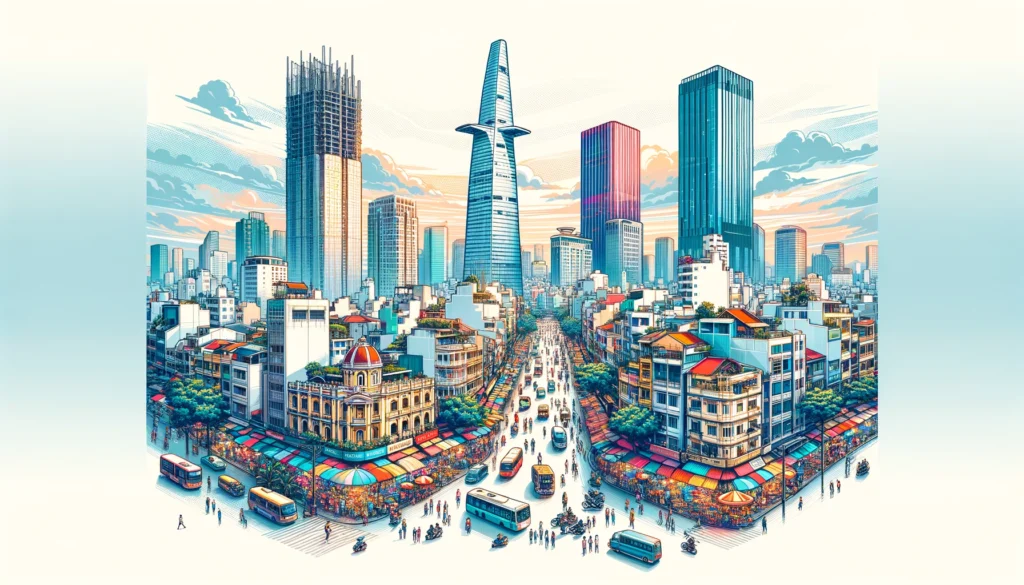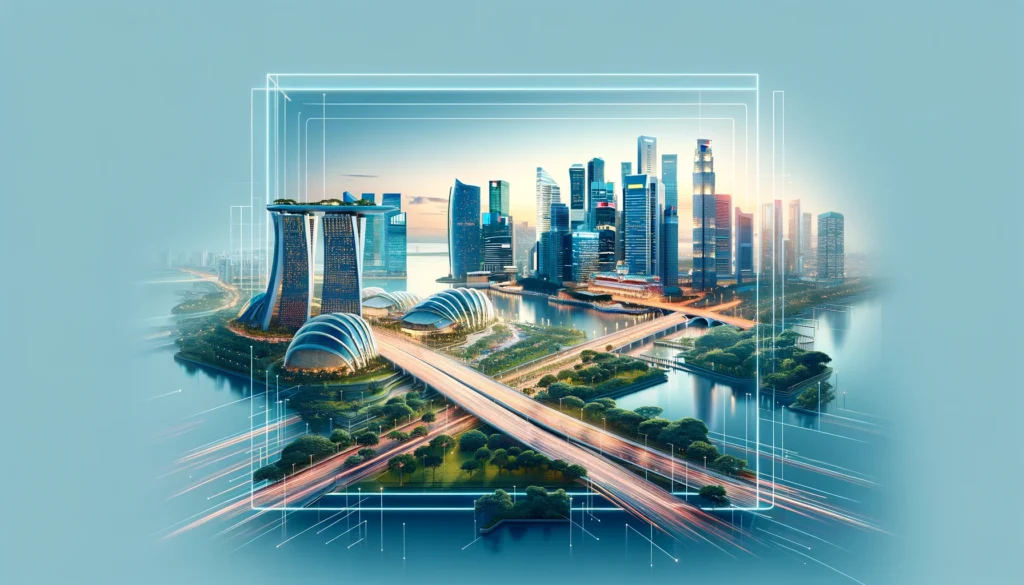Asia’s transformation into a digital nomad haven is as quiet as it is profound, marked by the soft clatter of keyboards against a backdrop of ancient cultures and modern innovation. This continent, a vibrant mosaic of history and future, now attracts those who live and work in the digital stream, seeking a place to stay and grow, explore, and connect. The shift from traditional office spaces to the vast, open canvas of Asia’s cities signifies a new chapter where work and wanderlust converge.
In this exploration, we’ll journey through cities that have become beacons for digital nomads, from the tranquil streets of Chiang Mai to the bustling avenues of Seoul. These places offer more than just a change of scenery; they promise a fusion of cultural depth, innovative spirit, and connectivity that today’s digital workers need. For digital nomads, these cities are not mere stops on a journey but gateways to experiences that enrich both their professional output and their personal growth.
Our guide through Asia’s best cities for digital nomads in 2024 is an invitation to discover where you can work remotely and live fully. Here, among ancient landmarks and skyscrapers, you’ll find a community that thrives on creativity, a lifestyle that balances work with wellness, and opportunities that span the spectrum of the digital age. Let’s embark on this adventure together, uncovering the places that offer a wifi connection and a connection to the world in its most vibrant form.
List of the Top 10 Cities in Asia for Digital Nomads in 2024:
- Chiang Mai, Thailand: Chiang Mai is renowned for its strong community of digital nomads, affordable living costs, and many coworking spaces. It’s in a culturally rich environment with numerous temples and markets to explore during your downtime.
- Ubud, Bali, Indonesia: Ubud offers a perfect blend of culture, nature, and a vibrant digital nomad community. While slightly pricier than in the past, it still provides excellent value with its artistic scene, yoga classes, and coworking spaces.
- Canggu, Bali, Indonesia: Known for its surf culture and relaxed lifestyle, Canggu is a favorite among digital nomads who prefer a balance of work and leisure. The community is welcoming, and there are many coworking spaces to choose from.
- Ho Chi Minh City, Vietnam: A bustling metropolis offering an affordable lifestyle without skimping on modern amenities. The city is filled with coworking spaces, cafes, and an international expat community.
- Seoul, South Korea: This city appeals to those looking for ultra-fast internet, advanced infrastructure, and a dynamic urban life. Seoul provides a safe and efficient environment for digital nomads, with plenty of unique spots to work and explore.
- Bangkok, Thailand: A city that never sleeps, Bangkok is known for its vibrant street life, culinary diversity, and excellent coworking spaces. The city offers a fast-paced lifestyle with the convenience of modern amenities.
- Singapore: If you’re into tech and prefer a more urban setting, Singapore might be your go-to with its futuristic skyline, efficient public services, and higher living standards, albeit at a higher cost.
- Kuala Lumpur, Malaysia: A city that offers a great mix of modernity and traditional culture, with an abundance of coworking spaces and a supportive community for digital nomads.
- Dali, China: Gaining popularity among young Chinese digital nomads, Dali offers a relaxed lifestyle with a growing tech scene, making it an interesting choice for those looking to experience a different facet of China.
- Jeju Island, South Korea: Known for its scenic beauty and relaxed pace, Jeju Island provides a unique setting with good internet connectivity and a welcoming community, ideal for those seeking a blend of work and nature.
Top Cities in Asia for Digital Nomads
Asia, a continent that seamlessly blends ancient traditions with futuristic innovation, offers a dynamic and diverse backdrop for digital nomads seeking inspiration and adventure. The section “Top Cities in Asia for Digital Nomads” delves into the best urban havens across this vast continent, each with its unique charm, from Jeju Island’s serene beaches to Bangkok’s bustling streets.
These cities are celebrated for their cultural richness and scenic beauty, robust digital infrastructure, welcoming communities, and affordability. Whether you’re a tech enthusiast, creative soul, or entrepreneurial spirit, discover how each city caters to the digital nomad lifestyle, offering the perfect balance of work, play, and exploration.
1. Chiang Mai, Thailand

Chiang Mai, nestled in the mountainous region of Northern Thailand, has emerged as a sanctuary for digital nomads worldwide. Its allure lies not only in its scenic beauty and tranquil lifestyle but also in its modern amenities and infrastructure, which cater seamlessly to the needs of remote workers.
Digital Nomad Essentials
- Internet Reliability: Chiang Mai boasts fast internet, a non-negotiable for digital workers. The city has numerous cafes and coworking spaces offering robust Wi-Fi connections, essential for seamless work and communication.
- Co-working Spaces: The city is home to various coworking spaces that cater to different tastes and working styles, from quiet, focus-enhancing environments to more vibrant, community-focused spaces. These hubs are not just about work; they are places where nomads can network, collaborate, and share insights, fostering a sense of community.
- Local Digital Nomad Community: Chiang Mai’s digital nomad community is thriving and welcoming. Regular meetups, workshops, and social events make it easy for newcomers to integrate and find like-minded individuals.
Cost of Living
- Accommodation: Chiang Mai offers a range of living options to suit various budgets. Monthly rentals can vary significantly, with comfortable apartments available from as low as $300 to luxury condos or villas at higher prices.
- Food: The city is a haven for food enthusiasts, offering delicious and affordable local Thai cuisine alongside international options. Street food can cost as little as $1-2 per meal, while dining in restaurants will be slightly more but still reasonable.
- Transportation: Getting around Chiang Mai is relatively inexpensive, whether you opt for local tuk-tuks, songthaews (shared taxis), or rent a scooter for more flexibility.
Culture, Food, and Activities
Chiang Mai is a cultural hub, with its ancient temples, traditional markets, and artisan communities offering a deep dive into Northern Thai culture. The city’s cuisine is renowned for its unique flavors, with must-try dishes like Khao Soi (curry noodle soup) reflecting the region’s culinary heritage. Beyond work, nomads can enjoy a variety of activities, from serene temple visits and nature hikes to vibrant night markets and cultural festivals.
Safety and Healthcare
- Safety: Chiang Mai is generally considered safe for expats and travelers, with low crime rates. However, standard precautions for personal safety and security are advised.
- Healthcare: The city has several reputable hospitals and clinics that provide quality medical care, with English-speaking staff available in many facilities. Health insurance is recommended to cover any medical needs during your stay.
2. Ubud, Bali, Indonesia

Ubud, nestled amidst Bali’s serene rice paddies and lush jungles, stands as a cultural and spiritual haven that magnetically attracts digital nomads. Known for its tranquil ambience and artistic flair, Ubud offers an ideal setting for creativity and productivity, away from the hustle of more touristic Balinese locations.
Digital Nomad Essentials
- Internet Reliability and Co-working Spaces: While Ubud’s internet connectivity may not be as robust everywhere, co-working spaces provide reliable high-speed internet, fostering a vibrant digital nomad community. Spaces like Outpost Ubud are popular hubs where nomads can work, network, and collaborate amidst tropical beauty.
- Local Digital Nomad Community: Ubud’s community is diverse, comprising entrepreneurs, artists, and wellness enthusiasts. This cultural melting pot offers a unique networking environment, enhanced by various coworking retreats and community events.
Cost of Living
- Accommodation: Housing varies widely, from simple rooms at $500 a month to luxurious houses with pools costing upwards of $1000. Regardless of budget, options abound to suit different preferences and lifestyles.
- Food: Ubud is a culinary paradise, especially renowned for its vegan and health-conscious eateries. Yet, it caters to all palates, offering a range of local to international dishes at reasonable prices.
- Transportation: Scooters are the most common and convenient way to navigate Ubud, available for rent at daily rates of $3-$5. Alternatively, ride-sharing apps offer easy transport solutions.
Culture, Food, and Activities
Ubud is the cultural nucleus of Bali, brimming with art galleries, craft markets, and dance performances. It’s also a wellness hub, with numerous yoga studios and holistic retreats. For leisure, digital nomads can explore ancient temples, scenic waterfalls, and engage in the town’s vibrant café culture.
Safety and Healthcare
Ubud is generally safe, with a laid-back atmosphere conducive to solo travelers and expats. Quality healthcare facilities are accessible, though it’s wise to have health insurance for comprehensive coverage during your stay.
3. Canggu, Bali, Indonesia

Canggu is renowned among digital nomads for its laid-back vibe, stunning beaches, and vibrant coworking community. Offering an eclectic blend of traditional Balinese culture and modern amenities, this coastal village caters well to those seeking a balanced lifestyle of work and leisure.
Digital Nomad Essentials
- Internet Reliability and Co-working Spaces: Canggu is a digital nomad’s paradise with excellent Wi-Fi and numerous coworking spaces. Notable spots like Dojo, located near Echo Beach, provide a community-oriented environment with fiber-optic Wi-Fi and various membership plans, ensuring a conducive workspace for everyone.
- Local Digital Nomad Community: The digital nomad scene in Canggu is buzzing, drawing a mix of aspiring and successful entrepreneurs. Coworking spaces frequently host events, creating ample opportunities for networking and collaboration.
Cost of Living
- Accommodation: Canggu offers diverse accommodation options, from budget-friendly guesthouses to upscale villas. Prices vary, but you can find a range of choices to suit your budget and lifestyle.
- Food: The culinary scene in Canggu is a mix of local delicacies like Babi Guling and international cuisine, catering to diverse tastes and dietary preferences. While eating out is affordable, be mindful of the additional taxes at bars and restaurants.
- Transportation: Scooters are the primary mode of transport, available for rent at affordable rates. For longer distances, hiring a local driver or using ride-hailing apps like Go-Jek is recommended.
Culture, Food, and Activities
Canggu is not just about work; it’s also about embracing the local culture and lifestyle. From surfing and yoga to exploring its trendy cafes and beachfront bars, there’s always something to do. The area’s international food scene is robust, offering everything from health-conscious eateries to comfort food joints.
Safety and Healthcare
While Canggu is generally safe, it’s essential to stay cautious and respect local customs. Avoid tap water, and be wary of the traffic and beach flags indicating swimming conditions. Healthcare facilities are accessible, but it’s wise to have comprehensive health insurance for your stay.
Canggu offers a dynamic and fulfilling experience for digital nomads, blending work, culture, and relaxation in a unique tropical setting. Whether you’re looking to network, relax, or explore, Canggu provides a comprehensive and engaging environment for digital nomads.
4. Ho Chi Minh City, Vietnam

Ho Chi Minh City, a dynamic and bustling metropolis, stands out as a prominent hub for digital nomads in Southeast Asia. Its vibrant street life, rich history, and entrepreneurial energy offer a stimulating environment for remote workers seeking a blend of tradition and modernity.
Digital Nomad Essentials
- Internet Reliability and Co-working Spaces: The city is well-equipped with high-speed internet and a plethora of coworking spaces like Dreamplex, Toong, and The Hive, providing optimal environments for productivity and networking.
- Local Digital Nomad Community: Ho Chi Minh City harbors a substantial expat community, with many engaging in English teaching or collaborating with local and international organizations. This diverse community offers ample opportunities for socializing and professional growth.
Cost of Living
- Accommodation: Living expenses can vary widely, but on average, digital nomads can expect to spend about $850 to $1,100 per month on living costs, including rent, transportation, and social activities.
- Food: Vietnamese cuisine is celebrated for its flavors and affordability, with street food options like pho costing around $2 and a range of dining experiences available to suit all budgets.
- Transportation: The city is navigable via motorbike, which many choose to buy or rent, as well as taxis and rideshare apps, offering convenient and cost-effective travel options.
Culture, Food, and Activities
- Ho Chi Minh City is rich in cultural experiences, from the historical War Remnants Museum to the bustling Ben Thanh Market. The city’s craft beer scene is burgeoning, providing a taste of local entrepreneurship and creativity.
- The culinary landscape is diverse, offering everything from traditional Vietnamese dishes to international cuisine, catering to all dietary preferences.
Safety and Healthcare
- While generally safe, it’s advisable to exercise standard precautions regarding personal belongings and traffic safety. The healthcare system includes access to quality medical facilities with English-speaking staff, though securing comprehensive health insurance is recommended.
Ho Chi Minh City offers a dynamic and enriching environment for digital nomads, blending cultural depth with a supportive and resource-rich setting for remote work. Whether you’re drawn to its historical sites, culinary delights, or professional opportunities, the city provides a compelling backdrop for a fulfilling nomadic lifestyle.
5. Seoul, South Korea

Seoul, South Korea’s bustling capital, offers a unique blend of traditional culture and cutting-edge technology, making it an appealing destination for digital nomads. Known for its fast internet, modern infrastructure, and vibrant street culture, Seoul combines the comforts of a developed city with rich cultural experiences.
Digital Nomad Essentials
- Internet Reliability: Seoul is renowned for its fast and ubiquitous Wi-Fi, a boon for digital nomads. Cafés, coworking spaces, and public areas provide reliable and high-speed internet access, essential for remote work.
- Co-working Spaces: The city boasts a variety of coworking spaces, such as WeWork, FastFive, and Maru 180, offering productive environments and networking opportunities. Many cafes also serve as informal workspaces, providing a unique working experience amidst Seoul’s hustle and bustle.
- Local Digital Nomad Community: Seoul has a thriving expat community, with numerous networking events and social gatherings that cater to digital nomads. The city’s tech-savvy environment and cultural offerings make it easy to connect with like-minded individuals and integrate into the local scene.
Cost of Living
- Accommodation: Costs can vary, but districts like Gangnam and Itaewon are pricier. However, exploring neighborhoods like Hongdae or Mangwon can offer more affordable living options while still providing access to the city’s amenities.
- Food: Korean cuisine is affordable and diverse, from street food to fine dining. The city’s food scene caters to all tastes, ensuring you’ll never tire of exploring its culinary delights.
- Transportation: Seoul’s public transport system, including the subway and buses, is efficient and cost-effective. Taxis and ridesharing apps like Kakao Taxi provide convenient alternatives, especially if language barriers arise.
Culture, Food, and Activities
Seoul is a cultural hub, offering everything from historical palaces and museums to contemporary art galleries and theaters. The city’s nightlife is vibrant, with numerous bars, clubs, and cafes open late into the night. For outdoor enthusiasts, nearby mountains like Bukhansan offer hiking opportunities with stunning city views.
Safety and Healthcare
Seoul is considered safe, with low crime rates and a reliable healthcare system. However, as with any large city, it’s wise to stay vigilant, especially at night and in crowded areas. The healthcare facilities are top-notch, with many English-speaking doctors available.
6. Bangkok, Thailand

Bangkok, a city known for its vibrant street life and cultural landmarks, is a favored destination for digital nomads. The city offers a blend of traditional Thai culture and modern conveniences, providing a dynamic backdrop for remote work.
Digital Nomad Essentials
- Internet Reliability: Bangkok boasts average internet speeds of around 100 Mbps, with many cafes and coworking spaces offering reliable and fast Wi-Fi, ensuring a productive work environment for digital nomads.
- Co-working Spaces: Bangkok has numerous coworking spaces catering to different tastes and work styles. Notable ones include The Hive Thonglor, Hubba Ekkamai, and Union Space, each providing unique atmospheres, networking opportunities, and facilities to suit various needs.
Cost of Living
- Accommodation: Living costs in Bangkok can vary widely. Affordable housing options are available outside the main tourist areas, with access to efficient public transport like the BTS Skytrain or MRT making it easy to navigate the city. Expect to pay around $300-$430 per month for a decent one-bedroom condo outside the city center.
- Food: Bangkok is a paradise for food lovers, offering an array of affordable dining options. Street food is ubiquitous and delicious, often costing less than $2 for a meal. For those who prefer cooking, local markets and supermarkets provide a variety of fresh, budget-friendly ingredients.
- Transportation: The city’s public transportation network is extensive and affordable. The BTS Skytrain and MRT cover significant parts of Bangkok, and taxis and ride-hailing services like Grab are readily available.
Culture, Food, and Activities
- Bangkok’s culture is a tapestry of traditional and modern influences, with endless opportunities to explore temples, markets, and museums. The city’s food scene ranges from local dishes like Pad Thai and Tom Yum Goong to international cuisine, satisfying all palates.
- Activities: The city offers various activities, from exploring historical sites like the Grand Palace to enjoying the nightlife in areas like Sukhumvit or Silom. Bangkok also serves as a gateway to other Thai destinations, providing ample travel opportunities.
Safety and Healthcare
- Bangkok is generally safe for digital nomads, with a low crime rate compared to other major cities. However, it’s always wise to be cautious, especially at night or in crowded areas. The healthcare in Bangkok is among the best in Southeast Asia, with numerous high-quality hospitals catering to different budgets and needs.
In summary, Bangkok presents a compelling mix of cultural richness, modern amenities, and affordability, making it an attractive base for digital nomads seeking an energetic and inspiring environment.
7. Singapore

Singapore is a bustling city-state known for its impeccable cleanliness, high-tech infrastructure, and vibrant mix of cultures. Its appeal to digital nomads lies in its robust tech ecosystem, excellent connectivity, and a plethora of co-working spaces and cafes conducive to productivity.
Digital Nomad Essentials
- Internet Reliability: Singapore boasts one of the fastest internet speeds globally, ensuring seamless connectivity for digital nomads whether they work from cafes, co-working spaces, or accommodations.
- Co-working Spaces: The city offers numerous co-working options like The Hive, JustCo, and WeWork, catering to various preferences and budgets. These spaces provide workstations, networking opportunities, and community engagement opportunities.
Cost of Living
- Accommodation: Options range significantly from co-living spaces like LYF FUNAN and Hmlet, which offer community and convenience, to private apartments. Monthly rents vary widely from $690 to $3800 USD, depending on location and amenities.
- Food: Singapore’s food scene is diverse, with options ranging from affordable hawker center meals to upscale dining experiences. Street food is a delicious and budget-friendly choice, offering a taste of the local cuisine.
- Transportation: The city’s public transportation system is efficient and extensive, making it easy to get around without a car. Taxis and ride-hailing services are also readily available.
Culture, Food, and Activities
Singapore is a melting pot of cultures, offering a rich tapestry of experiences from its food and festivals to its architecture and arts scene. Iconic attractions like Gardens By The Bay provide both leisure and inspiration. The city’s many parks and green spaces offer a respite from the urban environment.
Safety and Healthcare
Singapore is renowned for its safety and strict laws, providing a secure environment for residents and visitors alike. The healthcare system is advanced, offering high-quality medical services, though digital nomads are advised to have international health insurance.
8. Kuala Lumpur, Malaysia

Kuala Lumpur, the bustling capital of Malaysia, is rapidly becoming a favored destination for digital nomads. Its appeal lies in its vibrant mix of cultures, affordable living, and growing tech scene, making it a lively and diverse place to work and live.
Digital Nomad Essentials
- Internet Reliability: Kuala Lumpur offers fast and reliable internet, a crucial aspect for digital nomads. With an average speed of around 93 Mbps, the city is well-equipped for remote work, especially in populated areas.
- Co-working Spaces: The city boasts a variety of co-working spaces like Co-labs Coworking Tropicana Gardens, WORQ, and H Space, offering amenities ranging from basic hot desks to private offices and community events, with plans starting as low as $85 per month.
Cost of Living
- Accommodation: You can find diverse accommodation options, from luxury condos in the city center to more affordable suburban apartments. Monthly rentals in central areas like KLCC can range between $1,200 to $1,500, while outskirts like Bangsar offer options around $250 to $800 monthly.
- Food: Kuala Lumpur is renowned for its culinary scene, offering everything from street food to fine dining at reasonable prices. Eating out is a popular and affordable option, with meals for as little as $1.50 in places like Georgetown.
- Transportation: The city has an efficient public transport network, and services like Grab are widely used and inexpensive, making getting around the city accessible and affordable.
Culture, Food, and Activities
- Kuala Lumpur is a melting pot of cultures, providing a rich array of experiences, from visiting iconic sites like the Petronas Twin Towers to exploring local markets. The city’s diverse food scene offers many Malaysian, Chinese, and Indian cuisines.
Safety and Healthcare
- The city is generally safe, though it’s wise to be cautious of petty thefts like bag snatching. Healthcare in Kuala Lumpur is of high quality, with many public and private facilities accessible to foreigners. It’s recommended to have health insurance while staying in the city.
Visa and Legalities
- While Malaysia doesn’t offer a specific digital nomad visa, there are various options for longer stays, such as the tourist visa or the Multiple Entry Visa, depending on your nationality. The Malaysia My Second Home (MM2H) program offers long-term residency for those considering more permanent options.
In conclusion, Kuala Lumpur presents an attractive blend of affordability, cultural richness, and modern amenities, making it an excellent choice for digital nomads seeking a dynamic and comfortable environment to live and work.
9. Dali, China

Dali, nestled in China’s Yunnan province, is emerging as a favored destination for domestic digital nomads in China. Known for its tranquil environment, rich cultural heritage, and beautiful natural landscapes, Dali offers a compelling blend of relaxation and productivity for those looking to escape the urban grind.
Digital Nomad Essentials
- Internet Reliability and Co-working Spaces: While Dali is developing its infrastructure to support the digital nomad community, including co-working spaces like Dali Hub, potential nomads should prepare for China’s strict internet regulations by securing a reliable VPN service for unrestricted access.
- Local Digital Nomad Community: Dali is attracting a diverse community of digital nomads, including tech professionals, creatives, and educators, fostering a collaborative environment where people can share ideas and experiences.
Cost of Living
- Accommodation: Dali’s cost of living is relatively lower than in China’s major cities. For instance, rent costing around 5,000 RMB in Beijing could go down to about 1,500 RMB in Dali, significantly reducing living expenses.
- Food and Transportation: Dali offers a variety of affordable dining options and public transportation, making everyday expenses manageable for digital nomads.
Culture, Food, and Activities
- Dali’s rich history, evident in its ancient architecture and local customs, provides an enriching backdrop for residents. The area is also renowned for its natural beauty, from the Cangshan Mountains to Erhai Lake, offering plenty of outdoor activities.
Safety and Healthcare
- Dali is generally considered safe for foreigners. However, it’s essential to stay informed about local laws and practices. Healthcare facilities are available, but it’s advisable to have comprehensive health insurance while staying in China.
Embracing the “Lie Flat” Philosophy
- The city symbolizes China’s “lying flat” movement, where individuals reject the high-pressure work culture for a more balanced, slower-paced lifestyle. This philosophy is increasingly resonating with young Chinese professionals and is reflected in the growing popularity of Dali as a destination for those seeking an alternative way of living.
10. Jeju Island, South Korea

Jeju Island is an idyllic destination for digital nomads, offering a blend of stunning natural beauty, cultural richness, and modern amenities. Known for its fast WiFi, affordable cost of living, and many co-working spaces, Jeju Island provides a serene yet connected environment for remote work.
Digital Nomad Essentials
- Internet Reliability: Jeju boasts some of the fastest WiFi speeds globally, which is essential for digital nomads. The island is peppered with WiFi cafes and co-working spaces, ensuring connectivity is never an issue.
- Co-working Spaces: Jeju Island offers various co-working spaces, accommodating the growing remote work trend among Koreans and international nomads. These spaces provide professional environments at reasonable costs.
Cost of Living
- Accommodation: Living on Jeju Island is more affordable compared to major cities like Seoul. Rent for a modest house can be around 600,000 KRW ($530 USD) per month, with cheaper options available in shared accommodations or guesthouses.
- Food and Transportation: Eating out at local establishments is generally inexpensive, with meals averaging around 7,000-8,000 KRW ($6-7 USD). Public transportation is convenient and economical, with bus fares of around 1,200 KRW ($1 USD).
Culture, Food, and Activities
- Jeju Island is not just a place to work; it’s a location brimming with activities and cultural experiences. From hiking up Mount Halla to exploring waterfalls and enjoying local seafood delicacies, there’s always something to do. The island also boasts museums, galleries, and festivals celebrating its unique heritage.
Safety and Healthcare
- Jeju is considered safe for residents and travelers alike. The healthcare facilities on the island are adequate, but it’s advisable to have health insurance covering international care for a worry-free stay.

Considerations for Choosing a City
Visa and Legal Requirements
When choosing a city in Asia to settle as a digital nomad, understanding the visa and legal requirements is crucial. Each country has its own set of rules for foreign workers, including specific visas for digital nomads or business travelers. For instance, some countries may offer special visas that cater to remote workers, while others might require a standard tourist visa, which could limit the duration of stay. It’s essential to research each country’s visa policies, work permit requirements, and any legal considerations, such as taxation for remote income, to ensure compliance and avoid potential legal issues.
Digital Infrastructure
A robust digital infrastructure is vital for digital nomads to work effectively. This includes reliable high-speed internet access, availability of co-working spaces, and digital payment facilities. Cities known for their tech-forward approach typically offer better connectivity and support for digital services, ensuring you can work uninterrupted. Moreover, tech hubs or start-up ecosystems can indicate a city’s digital maturity, providing additional resources and networking opportunities for digital professionals.
Cultural Fit and Community
Integrating into the local culture and finding a community of like-minded individuals can significantly enhance your experience as a digital nomad. Cities with a vibrant expat or digital nomad community can offer a sense of belonging and support, making the transition smoother. Engaging with local customs, festivals, and traditions can also provide enriching experiences beyond work, contributing to personal growth and cultural understanding. Choosing a city with an active social scene for digital nomads can facilitate networking, collaboration, and socializing, adding value to your stay.
Language Barrier
Language can be a significant barrier in some Asian cities, potentially impacting your daily life and work. While many urban areas have a sizable English-speaking population, and English is commonly used in business, it’s not universal. Assessing the prevalence of English or the availability of language assistance services can help you choose a city where communication is less likely to be an obstacle. Learning basic phrases in the local language can significantly aid in daily interactions and show respect for the local culture.
Access to Nature and Recreation
For many digital nomads, the quality of life is just as important as work opportunities. Cities that offer easy access to nature and recreational activities can provide a much-needed balance to the digital lifestyle. Having recreational options can enhance your well-being and productivity, whether it’s beaches, mountains, parks, or cultural landmarks. Choosing a city that aligns with your interests, whether outdoor adventures, cultural exploration, or culinary experiences, can make your nomadic journey more fulfilling and enjoyable.
Personal Stories and Testimonials
Interviews or Quotes
Digital nomads have shared their varied experiences, illustrating the richness and diversity of the lifestyle. Johnny FD, for instance, transitioned from a scuba diving instructor to running a successful online business, embodying the spirit of adaptation and growth. Kristin Addis transformed her love for travel into a thriving blog and business, showcasing the potential for monetizing one’s passions. Similarly, Matt Kepnes and Natalie Sisson leveraged their travel experiences to create influential platforms and companies, demonstrating the vast opportunities available to digital nomads.
Success Stories
Lauren Squire and Andy Quarmby’s journey from casual travel to full-time digital nomadism highlights the long-term possibility of sustaining a nomadic lifestyle. Their story of transitioning to consistent work while traveling showcases the balance between exploration and professional commitment. Ivett from Budapest illustrates a determined shift from a conventional job to a fulfilling freelance design career, emphasizing the importance of pursuing one’s true calling. Sophie’s narrative of going from a routine job to an enriching digital nomad life underscores the transformative power of embracing remote work and travel.
These anecdotes glimpse successful digital nomads’ resilience, creativity, and adaptability, inspiring those contemplating or embarking on this lifestyle. The testimonies underscore the importance of perseverance, networking, and continuous learning in achieving location independence and professional fulfillment.
Practical Tips for Digital Nomads in Asia
Getting Settled
Finding suitable accommodation is crucial in establishing a comfortable base. Websites like Airbnb and local real estate platforms can offer various options from budget to luxury. In places like Kuala Lumpur, you can live comfortably on an average monthly budget of around $1,300, covering rent, meals, transportation, and leisure.
Setting up a local bank account can vary in complexity from country to country. Some places may require just a tourist visa, while others might need more documentation. Utilizing international banking services like Wise or Revolut can sometimes bypass the need for a local bank account entirely.
Navigating public transportation is essential for getting around efficiently. Most Asian cities have reliable and affordable public transport systems. Apps like Grab in Southeast Asia or local transport apps can provide real-time information and ease of travel.
Networking
Connecting with other digital nomads and local professionals can significantly enhance your experience. Joining local coworking spaces is a great way to meet like-minded individuals. Kuala Lumpur, for example, boasts various coworking spaces catering to a burgeoning digital nomad community.
Participating in community events and utilizing online platforms like Meetup or Facebook groups specific to digital nomads in your city can also provide valuable networking opportunities.
Cultural Etiquette
Understanding and respecting local customs and etiquette are crucial for integrating into the local community. Simple gestures like appropriate greetings, dress codes, and dining etiquette can show respect for the local culture.
For example, in Thailand and Indonesia, respecting elders and dressing modestly in temples are essential cultural practices. Meanwhile, in Malaysia, being mindful of diverse cultural norms due to its multicultural population is vital.
By adhering to these practical tips, digital nomads can navigate the complexities of settling into a new city, connect with a supportive community, and respect the cultural nuances that make each Asian destination unique.

Conclusion
As we wrap up our exploration of the best cities in Asia for digital nomads in 2024, it’s clear that Asia continues to stand out as a region where tradition meets innovation, providing a rich tapestry of experiences for those who wish to blend work with cultural exploration and adventure. From the serene landscapes of Chiang Mai to the bustling streets of Seoul, each city offers its unique allure, ensuring that every digital nomad can find their perfect match.
Our shared stories and testimonials illuminate the vast possibilities and paths to success within the digital nomad lifestyle. Whether it’s the entrepreneurial spirit of Johnny FD, the adventurous soul of Kristin Addis, or the creative journey of Ivett from Budapest, these narratives serve as a testament to digital nomads’ vibrant and resilient spirit.
Moreover, our practical tips aim to smooth your transition into your chosen city, helping you navigate the essentials from accommodation to networking and cultural integration. Remember, the key to a fulfilling digital nomad experience lies in embracing the local culture, connecting with fellow nomads and locals, and finding your rhythm in the balance between work and play.
Here’s to finding your niche in Asia’s vibrant landscape, where your digital nomad dream can flourish.

